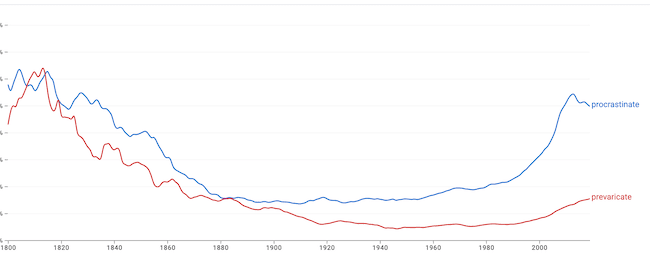
The two words procrastinate and prevaricate might seem like synonyms, but they have quite different meanings.
To procrastinate means to delay or postpone an action or to put off doing something.
To prevaricate means to speak or act in an evasive way.
However, they share a slightly similar sense in that both can involve delaying an action.
Using procrastinate and prevaricate in writing
Both words are useful in many contexts, but maybe more so for fiction writers.
Perhaps when describing the traits or actions of a character stalling for time, being indecisive, evasive, or vacillating, either word might be appropriate.
In usage, procrastinate is far more common than prevaricate.

But this doesn’t mean that it is always the best choice.
I can imagine that procrastinate is often used as a general-purpose word to describe someone delaying something.
But because prevaricate is not a synonym, it won’t appear in a thesaurus.
However, in some contexts, it might be a better vocabulary choice.
Of course, you could use many other words and synonyms for either word to add more variety to your writing.
But for the purpose of this article, I’ll stay with the differences between these two words.
When to use procrastination
Procrastination is the act of delaying or postponing something that needs doing.
We often associate it with laziness or a lack of motivation.
However, it can stem from various reasons, such as fear of failure, perfectionism, or feeling overwhelmed.
We usually view procrastination negatively because it can lead to missed deadlines, unfinished projects, and lost opportunities.
An example might be a student who puts off studying for an exam until the night before.
Another might be an employee who procrastinates on important work and finds they are not meeting their performance goals or perhaps even risking their job.
When you write about someone delaying, playing for time, or dithering about something that needs to be done, then procrastinate is the appropriate word.
When to use prevaricate
Prevarication is the action of intentionally avoiding the truth or being evasive in order to mislead or deceive someone.
There is often an element of dishonesty or falsehood.
However, it can also involve withholding information or making vague statements to avoid giving a direct answer.
We often associate the word with a politician who beats around the bush and refuses to answer a direct question about their stance on a controversial issue.
Similarly, someone who makes ambiguous statements about their whereabouts to avoid admitting they were somewhere they shouldn’t have been is also engaging in prevarication.
It is the best choice when there is an element of deceit, evasiveness, or being intentionally non-committal.
Related Reading: Straight-laced And Strait-laced – Which One Is Correct?
Key differences between procrastinate and prevaricate
Intention
Procrastination usually is unintentional and can stem from fear, anxiety, or feeling overwhelmed.
Prevarication, on the other hand, is intentional and is done to mislead or deceive someone.
Actions
Procrastination involves delaying or postponing action.
Prevarication is intentionally avoiding the truth or being evasive.
Consequence
Procrastination can have negative consequences like missed deadlines, unfinished projects, and lost opportunities.
Prevarication often has negative consequences, such as damaging one’s reputation or losing the trust of others.
Motivation
Procrastination is often the result of apprehension, worry, or a lack of motivation.
Prevarication, on the other hand, is often motivated by a desire to protect oneself or to achieve a particular outcome.
Sentence examples using both words
Here are some quick example sentences to help you understand how to choose the most suitable word in different contexts.
I always procrastinate for weeks before doing my taxes and then have to do it at the last minute.
The public knew he was prevaricating about the dubious qualifications on his resume.
The director decided to procrastinate on making a decision until even more information was available.
The salesperson prevaricated about the service history of the used car to make a quick sale.
Most writers are known to procrastinate on finishing their books, but they always get there in the end.
The witness prevaricated when asked about their whereabouts on the night of the crime.
Conclusion
You are not going to use these two words very often.
However, it is handy to know about the differences in meaning because the words are sometimes considered interchangeable.
But now you can see that they are not.
The best way to decide is to think about the motivation behind the delay or avoidance when choosing which word to use.
In a nutshell, procrastinating is the right word if it’s about delaying or putting something off.
But it’s prevaricating if the motivation is to avoid the truth or be intentionally evasive.
Related Reading: Is The Least Worst An Acceptable Phrase In Writing?



